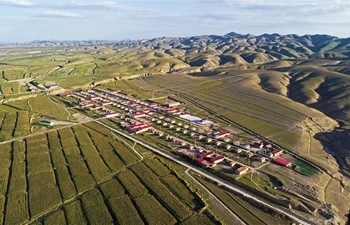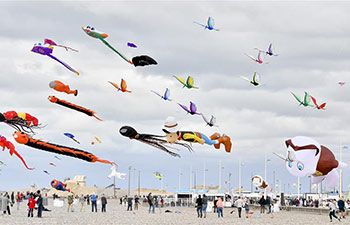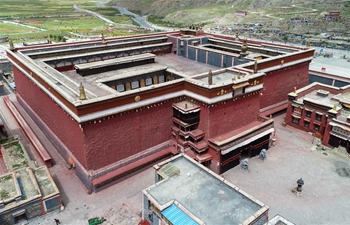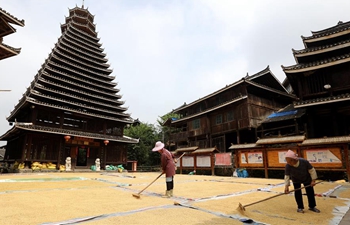
A Yemeni man talks to a seller at a market in Sanaa, Yemen, on Sept. 19, 2018. In the historical old city of Yemen's capital Sanaa, people here are suffering badly from war and air-sea-land blockade that has been devastating lives of more than 25 million population for over three years. (Xinhua/Mohammed Mohammed)
by Mohamed al-Azaki
SANAA, Sept. 19 (Xinhua) -- In the historical old city of Yemen's capital Sanaa, people here are suffering badly from war and air-sea-land blockade that has been devastating lives of more than 25 million population for over three years.
The war pitted Sunni government forces backed by a Saudi-led coalition against Shiite Houthi rebels allied with Iran.
More than three attempts by the United Nations to convene the warring parties throughout the past three years into a negotiating table to find a political solution to end the horrible civil war have failed.
The streets in the capital have become almost empty of regular movement, as a week-long severe fuel shortage forced hundreds of thousands of vehicles to silently die off the roads.
The major fuel crisis mostly hit the northern cities under the control of the rebels, including Sanaa.
The crisis was triggered by the escalating war in the country's strategic Red Sea port city of Hodeidah following the collapse of peace talks brokered by the United Nations in Geneva earlier this month.
United Nations describes humanitarian situations in Yemen as the "world's most worsening humanitarian and economic crisis in the modern history," warning that time is running out to prevent Yemen from falling into mass famine.
Muhsin al-Ashwal, a resident and a father in the historical old city of Sanaa, believed that the ongoing war and economic blockade have deeply impacted his life.
"We have become very poor, exhausted by hunger and begging in the streets due to hike of food prices," al-Ashwal said, referring to his family.
"No petrol or cooking gas.. the war and blockade kill us, kill our livestock.. destroy our farms and deeply impact lives of our children," he lamented.
On the corner, Sadiq Ali standed in his shop, complaining that his business is at risk because "customers lacked money and were not able to buy anymore."
"People have left their jobs after months of salary cut... before four months, a 50 kg of wheat was sold at 7,000 rials (17.5 U.S. dollars), now the wheat (of the same quantity) is sold at 15,000 rials (23 U.S. dollars now)," said trader Ali. "We all live very difficult life."
Another shop owner, Bakil Saleh, said "the war has already bankrupted my business."
Resident Awnallah al-Yaremi said he and his family suffer a lot due to what he described as "economic war."
"I want war to end," al-Yaremi hoped.
Hodeidah port is the entry point of about 70 percent of the country's food, medicines, aid and fuel.
Yemen's war has killed over 10,000 people, mostly civilians, displaced three million others and threatened more than 20 million population with mass famine.
Saudi Arabia is leading an Arab military coalition that intervened in Yemen in 2015 to support the government of President Abd-Rabbu Mansour Hadi after the Houthi rebels forced him into exile.
Trader Abduh al-Makhlaki said school students have stopped buying notebooks and pens from his shop.
"The economic war is worse than military war," he huffed. "Many families have become unable to afford the needs of their school children," al-Makhlaki said.
"Behead a man rather than cut off his livelihood," al-Makhlaki cited a famous Arab proverb as saying.















